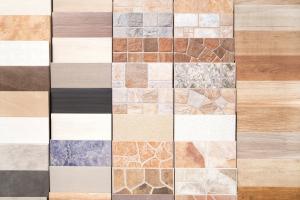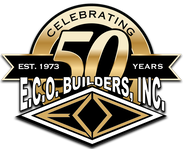
Top Flooring Materials That Perform Well in High-Moisture Bathroom Environments
Bathroom floors present unique challenges in both residential and commercial construction. Every flush, shower, and faucet contributes to a constantly humid atmosphere that demands more from flooring than in any other part of the building.
According to Elwin Ordoyne, Vice President of E.C.O. Builders Inc., based in Slidell, Louisiana, "Material choice in bathroom spaces must be strategic, especially in climates like South Louisiana where humidity is a constant year-round concern."
1. Porcelain and Ceramic Tile
Porcelain and ceramic tile remain industry standards for high-moisture environments. Both are non-porous when glazed, and their dense composition resists water penetration. Porcelain, in particular, has a lower absorption rate than ceramic, making it ideal for wet zones such as bathroom floors and shower areas.
These tiles can be manufactured to mimic natural stone, wood grain, or abstract patterns, offering design flexibility. However, installation quality is essential. Improper grouting or inadequate waterproofing underlayment can compromise the effectiveness of the material.
In commercial or high-traffic bathrooms, textured finishes are recommended to reduce slip hazards, especially when wet.
2. Luxury Vinyl Tile (LVT) and Plank (LVP)
Luxury vinyl products have surged in popularity due to advancements in manufacturing that offer waterproof cores and realistic surface textures. LVT and LVP are constructed with multiple layers, including a water-resistant vinyl core and a wear layer designed for abrasion resistance.
These floors are not only water-tolerant but also more forgiving underfoot than ceramic tile. Vinyl plank options often feature a locking mechanism that creates a tight seal, limiting moisture intrusion. However, any water that finds its way beneath the planks can still present issues if the subfloor is not adequately sealed.
Installation in bathrooms should always include perimeter sealing and be accompanied by moisture-resistant underlayment.
3. Natural Stone Tile
Natural stone options such as slate, granite, and marble provide a durable surface that can withstand moisture when properly sealed. Unlike ceramic and porcelain, natural stone is porous and requires regular sealing to maintain water resistance.
In coastal and humid regions like Southeast Louisiana, these tiles should be installed with an emphasis on vapor barrier protection beneath the surface. Without sealing, natural stone can absorb moisture, stain, or promote mildew growth.
Stone also tends to be colder underfoot and may require radiant heating or rugs in colder months, especially in residential bathrooms.
4. Concrete Flooring
Polished or stained concrete offers a contemporary look with exceptional moisture resistance. In ground-level bathrooms, especially in slab-built structures, sealed concrete provides a monolithic, water-resistant surface.
Concrete must be sealed to prevent moisture absorption and cracking. With the right finishing techniques, it can be made slip-resistant while maintaining a clean, modern aesthetic.
Concrete is also ideal in commercial applications where longevity and ease of maintenance are priorities. In new builds, concrete can be tinted or textured to resemble tile or natural stone without grout lines or joints.
5. Sheet Vinyl
Sheet vinyl remains a cost-effective and practical choice for moisture-prone spaces. Installed as a single continuous piece, it leaves few seams where water can infiltrate. High-quality options are now available with better visuals and textured surfaces that improve traction.
The primary benefit of sheet vinyl lies in its simplicity. With correct installation and sealing at the edges, it can effectively create a moisture barrier across the entire bathroom floor. However, care must be taken during installation to prevent curling or lifting at corners, which could lead to water intrusion.
Materials to Avoid in High-Moisture Bathrooms
Some flooring materials simply do not perform well in wet environments. Solid hardwood, for example, is highly susceptible to swelling, warping, and mold when exposed to moisture. Laminate, while more water-resistant than wood, can still be damaged by water seeping into seams.
Carpet, though rare in bathrooms today, traps moisture and dries slowly, making it an ideal environment for mold and bacteria growth. Even water-resistant laminates or engineered wood should be avoided unless specifically rated for bathroom installation and paired with proper moisture barriers.
Conclusion
In high-moisture environments like bathrooms—especially in Southern Louisiana’s warm and humid climate—the selection of proper flooring materials is crucial. Durability, slip resistance, and waterproof integrity are just as important as visual appeal. Whether the space is residential or commercial, proper installation, sealing, and ongoing maintenance will determine the longevity of the floor.
According to Elwin Ordoyne of E.C.O. Builders Inc., building with the climate in mind, especially when selecting flooring, is a decision that protects both property value and long-term performance. Bathroom floors that are chosen for their resistance to moisture and ease of maintenance consistently outperform those selected solely for aesthetic reasons.
Morgan Thomas
Rhino Digital, LLC
+1 504-875-5036
email us here
Visit us on social media:
Facebook
Distribution channels: Building & Construction Industry, Culture, Society & Lifestyle, Real Estate & Property Management
Legal Disclaimer:
EIN Presswire provides this news content "as is" without warranty of any kind. We do not accept any responsibility or liability for the accuracy, content, images, videos, licenses, completeness, legality, or reliability of the information contained in this article. If you have any complaints or copyright issues related to this article, kindly contact the author above.
Submit your press release

